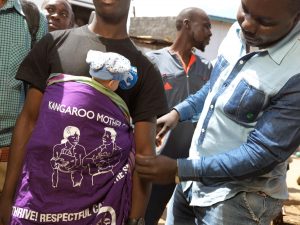
Victor Kibisu ( black T shirt) joins a KMC men’s sensitization session in Kibera slum. The slum is the second largest in Africa. Save the Children is strengthening the skills and capacity of health providers in seven hospitals located in the Langata area of Nairobi, Kenya, so that they can deliver higher quality care to preterm and low-birth-weight babies. The project is targeting to reach 2,200 new born babie each year. Kangaroo Mother Care (KMC) is the current recommended practice to care for stable preterm babies in Kenya. For babies, KMC promotes faster weight gain due to better thermoregulation and improved breastfeeding and therefore shorter hospital stay. KMC improves bonding between mother and baby and empowers mothers to play an active role in care for the newborn. KMC reduces dependency on incubators, does not require additional nursing staff and reduces cost per patient due to shorter hospital stays providing benefits for the health facility.
Background
Maternal and newborn mortality continue to be major challenges in Nigeria. While greater participation of men in maternal and newborn health has been associated with positive outcomes in many settings, male involvement remains low. The objective of this analysis was to investigate male involvement in maternal and newborn health in Jigawa state, northern Nigeria.
Methods
This qualitative study included 40 event narratives conducted with families who had experienced a maternal or newborn complication or death, in-depth interviews with 10 husbands and four community leaders, and four focus group discussions with community health workers. The interviews focused on understanding illness recognition and care seeking as well as the role of husbands at each stage on the continuum of maternal and newborn health. Data were transcribed, translated to English, and coded and analyzed using Dedoose software and a codebook developed a priori.
Results
This paper reports low levels of knowledge of obstetric and newborn complications among men and limited male involvement during pregnancy, childbirth and the post-partum period in Jigawa state. Men are key decision-makers around the location of the delivery and other decisions linked to maternal and newborn health, and they provide crucial resources including nutritious foods and transportation. However, they generally do not accompany their wives to antenatal visits, are rarely present for deliveries, and do not make decisions about complications arising during delivery and the immediate post-partum period. These gendered roles are deeply ingrained, and men are often ridiculed for stepping outside of them. Additional barriers for male involvement include minimal engagement with health programs and challenges at health facilities including a poor attitude of health providers towards men and accompanying family members.
Conclusion
These findings suggest that male involvement is limited by low knowledge and barriers related to social norms and within health systems. Interventions engaging men in maternal and newborn health must take into account these obstacles while protecting women’s autonomy and avoiding reinforcement of gender inequitable roles and behaviors.